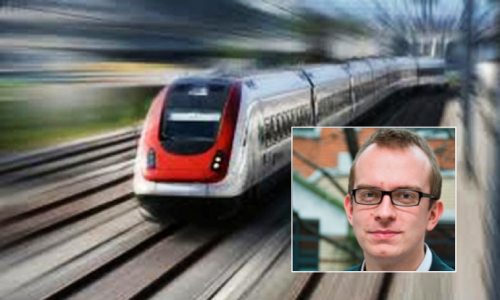
Long term infrastructure planning is the key
Ben Harrison, Director of Partnerships at Centre for Cities, contends we need to put aside the immediate distractions and begin to look at the part HS2 plays in the long term picture.
The debate surrounding the delivery of High Speed 2 has intensified over recent months, with the balance of opinion seemingly shifting towards the ‘No’ camp. However, the Government has recently renewed its case for investment in HS2, and providing it is aligned to smaller, incremental transport improvements within the cities it connects, the new line has the potential to be an important, strategic investment for the future of the UK economy.
Throughout the summer months, a number of high profile individuals from across the political spectrum have voiced their scepticism regarding the merits of HS2, from Alistair Darling to Lord Ashcroft. And this scepticism has extended to the general public too – a recent YouGov poll found that over half of those asked (55 per cent) said they were now against HS2 (compared to 46 per cent in July), with only 29 per cent stating they were firmly in support.
Nevertheless, the Government is determined to make the case that investing £50 billion in creating a new high-speed rail line linking London and Birmingham, and then Manchester and Leeds, can deliver tangible economic benefits across the UK. David Cameron, Nick Clegg and George Osborne have all gone on record about their support for HS2 as part of the UK’s strategy to ‘compete in the global race’.
Last week’s report from consultants KPMG attempted to shift the grounds of the HS2 debate from one rooted in the importance of shortening journey times and improving productivity, to focusing more on capacity and the benefits to local and regional economies.
This is important, as much of the early analysis failed to recognise the ability of people to work during the journey, undermining some of the productivity gains that would likely be achieved from quicker commutes.
Network Rail suggests the existing London to Birmingham line is already nearly at capacity, meaning action will to tackle this challenge will be required soon. Proponents argue that HS2 would have the potential to free up capacity for local and regional services, as well as giving regional businesses greater access to wider markets in London and elsewhere.
The renewed focus on economic benefits across localities and regions reflects a broader political vision for a more geographically balanced economy that relies less on London and the South East. KPMG’s report sets out a new cost/benefit analysis, indicating that the scheme has the potential to boost the UK economy by £15 billion a year, and that in terms of productivity gains, the North and Midlands will gain at least double the benefit that the South will.
But the question remains: will this refined case for HS2 be successful in turning the tide of political and public opinion back in favour of the scheme?
Some challenges certainly remain. First, the evidence is clear that if you want demonstrable economic benefits for limited money, the most effective way to do this is to invest in improving transport within and between cities – as Rod Eddington set out in his 2006 report.
Such incremental improvements will be vital to cities looking to make the most of HS2 – so this should not be seen as a zero sum game of investment in either HS2, or smaller projects. After all, if you can’t help many of the people who live around Birmingham to access the HS2 station, it will be harder for residents and local businesses to maximise the opportunities the new line offers.
Furthermore, transport provision is just one of the barriers to business investment. Without tackling the availability of land and premises, or of access to skilled labour, for example, HS2 will have a limited impact on the decisions businesses take to locate or expand.
Finally, questions should be raised about whether it will ever be possible to have a clear idea of the true benefits such a major project like HS2 can bring. According to the latest analysis, the project will take 18 years to complete, with the benefits accruing over 30 years after that if not more. However much we want to come up with a convincing evaluation of the project, the reality is no economic model can accurately predict that far into the future.
Ultimately, much of the debate about the potential benefit of HS2 comes down to whether you buy the argument that the scheme can help deliver on a long-term political vision to change the UK economy through improving transport links.
What is not up for debate is that historically, the UK has largely failed to plan adequately for our long term infrastructure needs. Instead, we regularly get caught up and distracted by short term debates – particularly at times where public spending is constrained – rather than thinking about when and where investments are needed to ensure that the economy can grow sustainably in the future.
Whatever the exact quantum of benefits it can bring, , strategic investment for the future of the UK economy. But it must be integrated into a more coherent economic development and infrastructure plan for the UK if the places HS2 connects are to make the most of the new links provided.
Published as part of:
Similar Articles
Key Conservatives on-board with HS2 1
In his keynote speech to the Conservative Conference in Manchester, David Cameron has backed HS2,
Sorry rail buffs: Great British Public will always believe HS2 is a colossal waste of money
There was no doubting the gold-plated credentials of speakers at the Greengauge 21 HS2 conference
Birmingham New Street commuters face chaos if HS2 isn’t built, warns Network Rail
Network Rail has renewed its campaign for HS2 by warning that failure to build a









